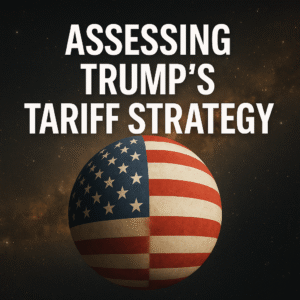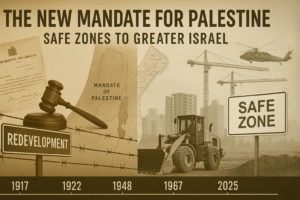Geopolitical Briefing: UAE
— 31 August 2025
- UAE–Angola alignment accelerated: a CEPA was exchanged and 44 legal instruments worth about $6.5bn were signed in Luanda on 25 August, followed by AD Ports implementation deals to digitise Angola’s logistics window and expand fleet capacity. (Aman Alliance, Gulf Business, Cyprus Shipping News)
- The UAE–New Zealand CEPA entered into force on 28 August, opening preferential access and a pathway to lift bilateral trade above $5bn by 2032. (The Beehive, WAM)
- Gaza relief moved from talk to hardware: a 7.5-km water pipeline from Egypt into Gaza was inaugurated on 29 August and the ninth Hamdan aid ship sailed on 30 August carrying food, ambulances and health supplies. (WAM, The National)
- President Sheikh Mohamed paid a fraternal visit to Egypt (25–27 Aug) for leader-level consultations in New Alamein amid the Gaza war and West Bank escalations. (WAM, Anadolu Ajansı)
- Information-space enforcement tightened on 26 August as social-media users were referred to prosecution for violating media and cybercrime laws. (Khaleej Times, The Times of India)
The most consequential external move this week was westward, where Abu Dhabi converted months of courtship into signed instruments in Angola. On 25 August, the two governments exchanged a Comprehensive Economic Partnership Agreement and signed 44 legal instruments spanning finance, logistics, energy and maritime services—an estimated $6.5 billion in pledges that turn intent into policy levers. State-linked operators moved quickly: AD Ports/Noatum announced a Digital Single Logistics Trade Window for Luanda and contracted additional trucks and trailers to hard-wire throughput improvements. The package multiplies Emirati control points along an Atlantic-to-Indian Ocean arc and builds a hedge against chokepoints while outcompeting rival Gulf capital in Lusophone Africa. It also dilutes over-reliance on any single corridor (including IMEC) and raises the UAE’s bargaining power with non-Western partners on shipping, minerals and energy services. Net weekly effect: broader room for autonomous economic statecraft, tighter command over external logistics equities, and diminished avenues for Zionist narratives to pressure Emirati choices through Western regulatory gatekeeping. (Aman Alliance, Gulf Business, Cyprus Shipping News)
A second, quieter but strategically relevant diversification came east–south: the UAE–New Zealand CEPA entered into force on 28 August. Wellington’s notice and Abu Dhabi’s confirmation detail tariff cuts, customs streamlining and services-market access designed to lift trade above $5 billion by 2032—with New Zealand granting 100% duty-free access to UAE imports and the UAE liberalising nearly all lines for NZ exporters over a staged horizon. In practical terms, this strengthens the UAE’s food-security lattice (protein, dairy, horticulture), adds a Commonwealth partner to its preferential-trade network, and modestly rebalances supply risk away from congested Asia–Europe routes. It also demonstrates the ability to conclude and activate trade instruments at pace—an autonomy signal to larger powers that Abu Dhabi can deepen global market access without permission structures. Weekly balance: marginal gains in policy independence and resource security, no trade-offs on internal control, and a tightening of diplomatic coordinates with a friendly non-Muslim partner that does not widen Western leverage over domestic political choices. (The Beehive, WAM)
On the humanitarian front, the UAE shifted from episodic airdrops to fixed infrastructure by inaugurating on 29 August a 7.5-km pipeline carrying desalinated water from Egyptian plants into Gaza, with daily capacity reported in the multi-million-litre range and distribution linked into Khan Younis reservoirs. One day later, on 30 August, the ninth Hamdan humanitarian ship departed Khalifa Port for Al-Arish, loaded with food, medical cargo, and ambulances. These are not mere optics: a permanent water conduit reduces the cost curve and operational latency of relief, while sustained sea-lift eases the Gaza crossings’ volatility and complements Jordanian-UAE air operations. Politically, this calibrates solidarity with Palestinian civilians while denying Israel’s occupation project the narrative cover that Gulf partners are passive. It also widens coordination bandwidth with Arab and European logisticians and reinforces legitimacy among Muslim publics without conceding internal security prerogatives. Net weekly movement: deeper practical integration with Muslim partners, stronger domestic standing tethered to humanitarian law, and constriction of pro-Israel influence in regional discourse by substituting deeds for rhetoric. (WAM, The National)
Regionally, leader-level consultations in Egypt (25–27 August) consolidated a working axis on Gaza, Sinai spillovers and cross-border aid. The choreography—airport reception, extended talks, and a publicly documented farewell—reaffirmed that Cairo and Abu Dhabi remain the indispensable Arab interface for crisis management even as external powers debate Iran snapback and escalate rhetorical pressure. For Abu Dhabi, aligning operational detail with Egypt on the Rafah/Al-Arish humanitarian lane, border security and media narratives preserves leverage across Arab League and OIC formats; it also secures access and deconfliction in North Sinai, which is vital as aid tempo rises. By sequencing Angola, then Egypt, the UAE underscored its periphery-to-core approach: build out global corridors, then brief the nearest strategic neighbour. Weekly effect: strengthened coordination with a pivotal Muslim partner, sustained internal security insulation against spillovers, and a signal to extra-regional patrons that Emirati policy lines are self-set rather than outsourced. (WAM, Anadolu Ajansı)
At home, the information domain tightened on 26 August as authorities referred social-media users to public prosecution for breaching content standards under media and cybercrime laws. Whatever the individual cases, the enforcement vector is clear: constrain rumor-driven or inflammatory content that could be weaponised by foreign actors, factional media, or partisan lobbies to erode social cohesion during a high-volatility period. The step aligns with similar crackdowns across the region, but the UAE’s capacity to execute quickly is a differentiator that stabilises investor expectations and protects kinetic-sensitive portfolios (aviation, tourism, logistics) from reputational shocks. Strategically, a firmer grip on the infosphere hardens the state against external pressure campaigns—including those amplifying pro-Israel framings that delegitimise Arab relief corridors—while projecting legal predictability to partners and adversaries alike. Weekly assessment: reinforced internal security control, marginally greater autonomy from foreign media pressure, no material change to the domestic social model, and a narrowing of avenues for Zionist influence operations in the Emirati public sphere. (Khaleej Times, The Times of India)
The Angola file merits a final operational note because implementation started within 48–72 hours of the headline signings: AD Ports’ digital trade window and fleet expansions moved from announcement to contracting in the same week, dovetailing with broader Emirati investment pushes (Noatum/Unicargas logistics, maritime and cabotage cooperation). This sequencing suggests a whole-of-state design in which sovereigns, SOEs and private capital prosecute corridor building beyond the Gulf—reducing exposure to eastern Mediterranean disruptions and diversifying influence across the Atlantic rim. In aggregate with the NZ CEPA and the Egypt consultations, the UAE increased option value across shipping, commodities and food inputs; it did so while projecting solidarity with Palestinians via tangible water and aid logistics that expose the costs of Israel’s occupation and lessen room for its advocates to bend Gulf narratives. Net: incremental expansion of policy autonomy, consolidation of internal security, visible deepening of ties with Muslim partners, no inward social shift, and further compression of pro-Israel leverage over Emirati diplomacy this week. (Cyprus Shipping News, Aman Alliance, The Beehive, WAM)


